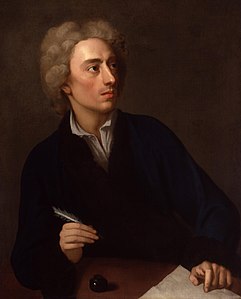Book I. Epistle VII.
Alexander Pope 1688 (London) – 1744 (Twickenham)
IMITATED IN THE MANNER OF DR SWIFT.
'Tis true, my lord, I gave my word,
I would be with you, June the third;
Changed it to August, and (in short)
Have kept it--as you do at court.
You humour me when I am sick,
Why not when I am splenetic?
In town, what objects could I meet?
The shops shut up in every street,
And funerals blackening all the doors,
And yet more melancholy whores:
And what a dust in every place!
And a thin court that wants your face,
And fevers raging up and down,
And W---- and H---- both in town!
'The dog-days are no more the case.'
'Tis true, but winter comes apace:
Then southward let your bard retire,
Hold out some months 'twixt sun and fire,
And you shall see, the first warm weather,
Me and the butterflies together.
My lord, your favours well I know;
'Tis with distinction you bestow;
And not to every one that comes,
Just as a Scotchman does his plums.
'Pray, take them, sir,--enough's a feast:
Eat some, and pocket up the rest.'
What! rob your boys? those pretty rogues
'No, sir, you'll leave them to the hogs.'
Thus fools with compliments besiege ye,
Contriving never to oblige ye.
Scatter your favours on a fop,
Ingratitude's the certain crop;
And 'tis but just, I'll tell ye wherefore,
You give the things you never care for.
A wise man always is, or should,
Be mighty ready to do good;
But makes a difference in his thought
Betwixt a guinea and a groat.
Now this I'll say, you'll find in me
A safe companion, and a free;
But if you'd have me always near--
A word, pray, in your honour's ear.
I hope it is your resolution
To give me back my constitution!
The sprightly wit, the lively eye,
Th' engaging smile, the gaiety,
That laugh'd down many a summer sun,
And kept you up so oft till one:
And all that voluntary vein,
As when Belinda[168] raised my strain.
A weasel once made shift to slink
In at a corn-loft through a chink;
But having amply stuff'd his skin,
Could not get out as he got in:
Which one belonging to the house
('Twas not a man, it was a mouse)
Observing, cried, 'You 'scape not so;
Lean as you came, sir, you must go.'
Sir, you may spare your application,
I'm no such beast, nor his relation;
Nor one that temperance advance,
Cramm'd to the throat with ortolans:
Extremely ready to resign
All that may make me none of mine.
South-Sea subscriptions take who please,
Leave me but liberty and ease.
'Twas what I said to Craggs and Child,
Who praised my modesty, and smiled.
Give me, I cried, (enough for me)
My bread, and independency!
So bought an annual rent or two,
And lived--just as you see I do;
Near fifty, and without a wife,
I trust that sinking fund, my life.
Can I retrench? Yes, mighty well,
Shrink back to my paternal cell,
A little house, with trees a-row,
And, like its master, very low.
There died my father, no man's debtor,
And there I'll die, nor worse, nor better.
To set this matter full before ye,
Our old friend Swift will tell his story.
'Harley, the nation's great support'--
But you may read it,--I stop short.
Font size:
Submitted on August 03, 2020
Modified on March 05, 2023
- 2:55 min read
- 5 Views
Quick analysis:
| Scheme | A BBCCDDEEFFGGHH GGIJJJ KKLLXXXXMMXXIXNNXX MMXXOOXAOOPP DXQQRRKK OOXFSSTTUUMFVVWWXXKKJJ MM CC |
|---|---|
| Closest metre | Iambic tetrameter |
| Characters | 2,925 |
| Words | 572 |
| Stanzas | 9 |
| Stanza Lengths | 1, 14, 6, 18, 12, 8, 22, 2, 2 |
Translation
Find a translation for this poem in other languages:
Select another language:
- - Select -
- 简体中文 (Chinese - Simplified)
- 繁體中文 (Chinese - Traditional)
- Español (Spanish)
- Esperanto (Esperanto)
- 日本語 (Japanese)
- Português (Portuguese)
- Deutsch (German)
- العربية (Arabic)
- Français (French)
- Русский (Russian)
- ಕನ್ನಡ (Kannada)
- 한국어 (Korean)
- עברית (Hebrew)
- Gaeilge (Irish)
- Українська (Ukrainian)
- اردو (Urdu)
- Magyar (Hungarian)
- मानक हिन्दी (Hindi)
- Indonesia (Indonesian)
- Italiano (Italian)
- தமிழ் (Tamil)
- Türkçe (Turkish)
- తెలుగు (Telugu)
- ภาษาไทย (Thai)
- Tiếng Việt (Vietnamese)
- Čeština (Czech)
- Polski (Polish)
- Bahasa Indonesia (Indonesian)
- Românește (Romanian)
- Nederlands (Dutch)
- Ελληνικά (Greek)
- Latinum (Latin)
- Svenska (Swedish)
- Dansk (Danish)
- Suomi (Finnish)
- فارسی (Persian)
- ייִדיש (Yiddish)
- հայերեն (Armenian)
- Norsk (Norwegian)
- English (English)
Citation
Use the citation below to add this poem to your bibliography:
Style:MLAChicagoAPA
"Book I. Epistle VII." Poetry.com. STANDS4 LLC, 2024. Web. 23 Apr. 2024. <https://www.poetry.com/poem/54667/book-i.-epistle-vii.>.



Discuss the poem Book I. Epistle VII. with the community...
Report Comment
We're doing our best to make sure our content is useful, accurate and safe.
If by any chance you spot an inappropriate comment while navigating through our website please use this form to let us know, and we'll take care of it shortly.
Attachment
You need to be logged in to favorite.
Log In